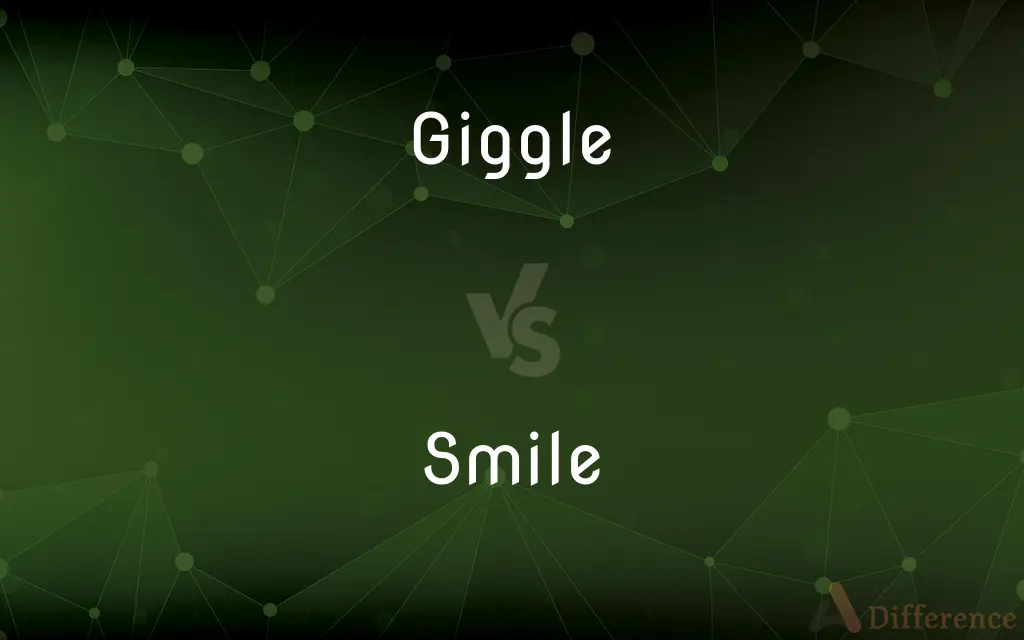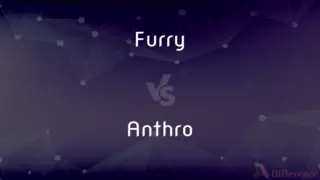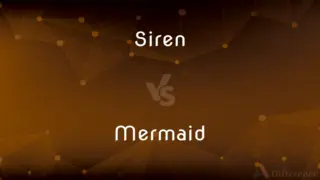Giggle vs. Smile — What's the Difference?
By Fiza Rafique & Urooj Arif — Updated on April 23, 2024
A giggle is a light, often spontaneous laugh indicating amusement, while a smile is a facial expression formed by upturning the corners of the mouth, typically showing happiness or pleasure.

Difference Between Giggle and Smile
Table of Contents
ADVERTISEMENT
Key Differences
Giggling involves a vocal expression that conveys laughter in a light, sometimes uncontrollable manner. It often results from amusement, nervousness, or embarrassment. On the other hand, smiling is a silent, visual expression that generally indicates happiness, satisfaction, or a polite acknowledgment and does not necessarily involve audible sound.
When you giggle, it usually involves a series of quick, high-pitched vocal sounds that are reflexive and can be contagious among groups. In contrast, smiling is a universal social gesture that involves facial muscles, particularly those around the mouth and eyes, and is recognized across different cultures as a sign of friendliness or contentment.
A giggle can break the ice in socially awkward situations, making it a form of communication that lightens the mood. Whereas a smile can serve multiple purposes, such as welcoming someone, showing agreement, or expressing joy, making it a versatile tool in social interactions.
Giggling is often involuntary and can be triggered by humor, tickling, or even nervous reactions. It is more informal and can be seen as less controlled than smiling, which can be both involuntary and deliberate, crafted to suit the situation, whether it be social, professional, or casual.
In terms of social perception, a giggle might be perceived as a sign of lightheartedness or immaturity, depending on the context. Meanwhile, a smile is generally regarded positively, conveying warmth, approachability, and confidence, and is appropriate in a wide range of contexts.
ADVERTISEMENT
Comparison Chart
Nature
Auditory, spontaneous
Visual, controlled or spontaneous
Typical Indication
Amusement, nervousness
Happiness, friendliness
Social Context
Casual, informal
Broad, ranging from casual to formal
Physical Expression
Vocal laughter, light
Facial movement, primarily mouth and eyes
Perception
May be seen as immature or lighthearted
Often seen as mature, warm, welcoming
Compare with Definitions
Giggle
Can be involuntary or uncontrollable.
The joke made her giggle uncontrollably.
Smile
May be deliberate or spontaneous.
She smiled warmly at the thoughtful gift.
Giggle
A light and quick laugh.
She couldn't help but giggle at the clumsy antics of the puppies.
Smile
Can be used to express politeness.
He gave a polite smile to the stranger.
Giggle
Reflects amusement or nervousness.
Nervous giggles filled the room when the speaker slipped on stage.
Smile
A facial expression showing happiness or approval.
Her smile lit up the room as she greeted her guests.
Giggle
Often shared in social groups.
Their giggles over the inside joke were infectious.
Smile
Engages facial muscles, especially around the mouth and eyes.
His genuine smile reached his eyes, making everyone feel welcome.
Giggle
Indicates a light-hearted spirit.
His giggle during the game showed his fun-loving nature.
Smile
Universal sign of friendliness and warmth.
They exchanged smiles upon meeting, breaking the initial tension.
Giggle
To laugh with repeated short, spasmodic sounds.
Smile
A smile is formed primarily by flexing the muscles at the sides of the mouth. Some smiles include a contraction of the muscles at the corner of the eyes, an action known as a Duchenne smile.
Giggle
To utter while giggling.
Smile
A facial expression characterized by an upward curving of the corners of the mouth and indicating pleasure, amusement, or derision.
Giggle
A short, spasmodic laugh.
Smile
To have or form a smile.
Giggle
To laugh gently in a playful, nervous, or affected manner.
The jokes had them giggling like little girls all evening.
Smile
To look with favor or approval
Fortune smiled on our efforts.
Giggle
A high-pitched, silly laugh.
Smile
To express cheerful acceptance or equanimity
We smiled at the bad weather and kept going.
Giggle
(informal) Fun; an amusing episode.
We put itching powder down his shirt for giggles.
The women thought it would be quite a giggle to have a strippergram at the bride's hen party.
Smile
To express with a smile
Grandmother smiled her consent.
Giggle
To laugh with short catches of the breath or voice; to laugh in a light, affected, or silly manner; to titter with childish levity.
Giggling and laughing with all their mightAt the piteous hap of the fairy wight.
Smile
A facial expression comprised by flexing the muscles of both ends of one's mouth, often showing the front teeth, without vocalisation, and in humans is a common involuntary or voluntary expression of happiness, pleasure, amusement, goodwill, or anxiety.
She's got a perfect smile.
He has a sinister smile.
She had a smile on her face.
He always puts a smile on my face.
Giggle
A kind of laugh, with short catches of the voice or breath; a light, silly laugh.
Smile
(figurative) Favour; propitious regard.
The smile of the gods
Giggle
A foolish or nervous laugh
Smile
A drink bought by one person for another.
Giggle
Laugh nervously;
The girls giggled when the rock star came into the classroom
Smile
(ambitransitive) To have (a smile) on one's face.
When you smile, the whole world smiles with you.
I don't know what he's smiling about.
She smiles a beautiful smile.
Smile
(transitive) To express by smiling.
To smile consent, or a welcome
Smile
(intransitive) To express amusement, pleasure, or love and kindness.
Smile
(intransitive) To look cheerful and joyous; to have an appearance suited to excite joy.
The sun smiled down from a clear summer sky.
Smile
(intransitive) To be propitious or favourable; to countenance.
The gods smiled on his labours.
Smile
To express amusement, pleasure, moderate joy, or love and kindness, by the features of the face; to laugh silently.
He doth nothing but frown. . . . He hears merry tales and smiles not.
She smiled to see the doughty hero slain.
When last I saw thy young blue eyes, they smiled.
Smile
To express slight contempt by a look implying sarcasm or pity; to sneer.
'T was what I said to Craggs and Child,Who praised my modesty, and smiled.
Smile
To look gay and joyous; to have an appearance suited to excite joy; as, smiling spring; smiling plenty.
The desert smiled,And paradise was opened in the wild.
Smile
To be propitious or favorable; to favor; to countenance; - often with on; as, to smile on one's labors.
Smile
To express by a smile; as, to smile consent; to smile a welcome to visitors.
Smile
To affect in a certain way with a smile.
And sharply smile prevailing folly dead.
Smile
The act of smiling; a peculiar change or brightening of the face, which expresses pleasure, moderate joy, mirth, approbation, or kindness; - opposed to frown.
Sweet intercourseOf looks and smiles: for smiles from reason flow.
Smile
A somewhat similar expression of countenance, indicative of satisfaction combined with malevolent feelings, as contempt, scorn, etc; as, a scornful smile.
Smile
Favor; countenance; propitiousness; as, the smiles of Providence.
Smile
Gay or joyous appearance; as, the smiles of spring.
The brightness of their [the flowers'] smile was gone.
Smile
A facial expression characterized by turning up the corners of the mouth; usually shows pleasure or amusement
Smile
Change one's facial expression by spreading the lips, often to signal pleasure
Smile
Express with a smile;
She smiled her thanks
Common Curiosities
How is a smile different from a giggle?
A smile is a silent facial expression that generally shows happiness or pleasure, unlike a giggle, which involves audible laughter.
What is a giggle?
A giggle is a light and often quick laugh that indicates amusement or nervousness.
Can giggling be inappropriate?
Yes, giggling can be seen as inappropriate in serious or formal settings where quiet and decorum are expected.
What are the benefits of giggling?
Benefits of giggling include stress relief, strengthening social bonds, and enhancing group cohesion through shared laughter.
Is it possible to control a giggle?
Controlling a giggle can be difficult, especially if it is triggered by genuine amusement or nervousness.
Can smiling impact social interactions?
Yes, smiling positively impacts social interactions by making individuals appear more approachable, trustworthy, and cooperative.
What does a giggle signify in different cultures?
In many cultures, a giggle might signify light-heartedness or shyness, but it can vary widely based on context and social norms.
How can one tell if a smile is genuine?
A genuine smile, also known as a Duchenne smile, involves both the muscles around the mouth and the eyes.
Is it good to giggle often?
While giggling can signify joy and playfulness, excessive giggling might be perceived as nervousness or immaturity in certain contexts.
Why do people smile?
People smile to express happiness, friendliness, agreement, or as a polite gesture in social interactions.
What psychological effects does smiling have?
Smiling can improve mood, reduce stress, and is often contagious, enhancing social bonds.
Why do some people giggle when they are nervous?
Nervous giggling is a physiological response to anxiety, serving as a coping mechanism to relieve tension.
How can I use smiling effectively in communication?
Use smiling to convey friendliness, openness, and positivity in interactions, adapting to the social cues and norms of your environment to ensure it is perceived appropriately.
What cultural differences exist in interpreting smiles and giggles?
Cultural interpretations can vary, with some cultures viewing giggling as informal or inappropriate in certain settings, while smiles are generally universally positive.
How is a forced smile different from a genuine smile?
A forced smile might not engage the eyes and can appear less warm and welcoming compared to a genuine smile that involves the entire face.
Share Your Discovery

Previous Comparison
Furry vs. Anthro
Next Comparison
Siren vs. MermaidAuthor Spotlight
Written by
Fiza RafiqueFiza Rafique is a skilled content writer at AskDifference.com, where she meticulously refines and enhances written pieces. Drawing from her vast editorial expertise, Fiza ensures clarity, accuracy, and precision in every article. Passionate about language, she continually seeks to elevate the quality of content for readers worldwide.
Co-written by
Urooj ArifUrooj is a skilled content writer at Ask Difference, known for her exceptional ability to simplify complex topics into engaging and informative content. With a passion for research and a flair for clear, concise writing, she consistently delivers articles that resonate with our diverse audience.













































